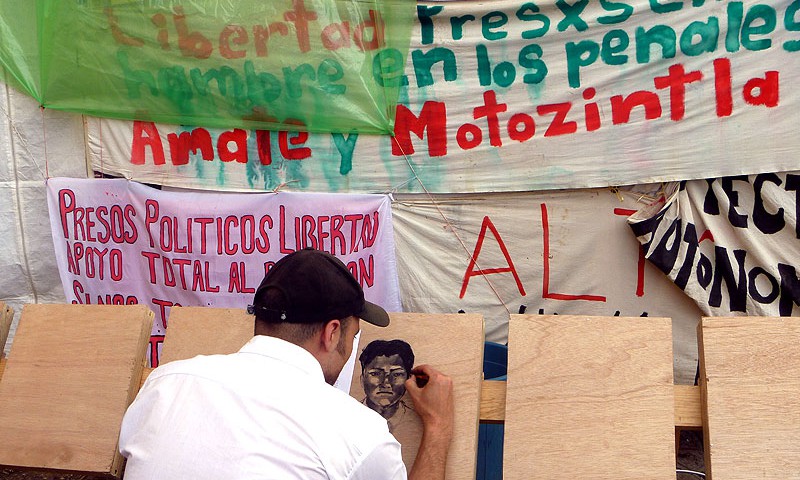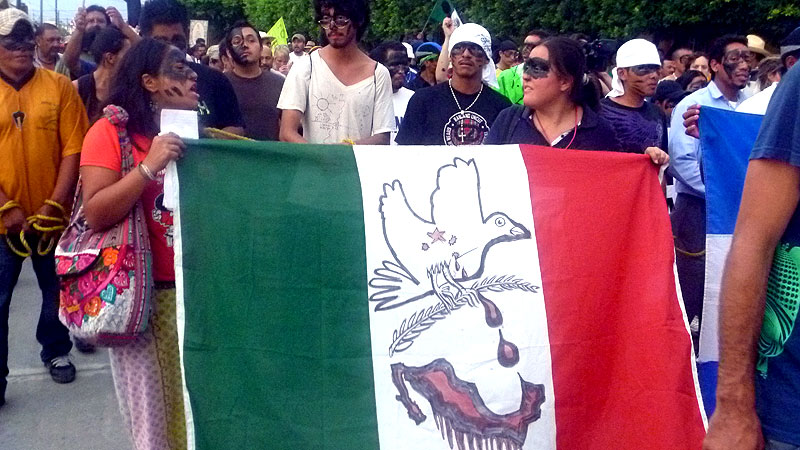Actividades de SIPAZ (De mediados de mayo a mediados de agosto de 2011)
31/08/20112011
03/01/201229 September 2011: Eleven of the indigenous prisoners held in the San Cristóbal de Las Casas prison saw no other option than to subject themselves to a hunger strike in light of their sentences, which they consider unjust, in addition to abuses on the part of prison authorities. They put their lives at risk in the hope of being heard. On 6 November they suspended their protest without having succeeded in having all cases reconsidered. Two prisoners were freed on 14 October, and another two were released on 15 November.
This situation does not represent an isolated case in Mexico, where there exists a systematic tendency toward harassment, torture, and repression in the processes that are experienced from the moment of initial arrest, when the detained are “presumed guilty,” to imprisonment. Torture against the incarcerated as an ever-present reality has been documented by several human rights organizations, both national and international. In July 2011, during a visit to Mexico, the “Action of Christians for the Abolition of Torture” (ACAT France) reported that in the country there exists a “systematic persistence of torture”. The organization noted that the “cases that come to be reported cannot be simply considered isolated affairs.” In addition, the judicial processes frequently violate the fundamental rights of the imprisoned due to the lack of access to impartial and independent proceedings. The 11 imprisoned who participated in the aforementioned hunger strike and fasting denounced that they at no time had their right to legal defense honored, let alone translation to their native tongues or a process in which they could have just defense.
As we have said, this reality affects men and women from the moment of arrest. One example is the case of Rosa López Díaz, a woman who supported the strike by carrying out daily 12-hour fasts; according to her testimony, she was detained on 10 May 2007 in San Cristóbal de Las Casas by individuals dressed in civilian clothes. Rosa denounced that they beat her in the stomach repeatedly: “[…] the sad thing is that for me as woman I had been pregnant for four months, and for this reason I begged them not to beat me due to my gestation period […]. As time passed I gave birth in Cereso No. 5 to a boy that I have named Nataniel. Sadly, due to the beatings I received, my son was born with cerebral palsy, and so has no movement in any of his body, in addition to other conditions […].” The child died toward the end of October of this year.
Physical and psychological torture also continues in prison. According to the Fray Bartolomé de Las Casas Center for Human Rights, the government does not meet its responsibility to guarantee basic rights, nor does it protect the life and physical integrity of those held in different prisons across the state. There is testimony of innocent individuals held in the so-called State Centers for the Social Reinsertion of the Sentenced (CERSS) who protest against unjust and inhumane conditions, sexual violence, overcrowding, unhygienic living conditions, lack of medical attention, as well as lack of or poor quality food. These centers leave their mark on those held there; they in no way facilitate the subsequent reintegration of the incarcerated into their communities. They also represent a punishment for the families and strain their economic situation, given that they disrupt familial life and imply enormous economic costs that must be paid.
One of those who engaged in the hunger strike was Professor Alberto Patishtán Gómez, a Tsotsil indigenous man from the community of El Bosque. He has been imprisoned since 2000, accused together with others of the homicide of six police officers, following a court case plagued by violations of due process, with inconsistent evidence against him, despite the fact that Patishtán “offered reasonable evidence of his not having participated in the ambush” (La Jornada, 27 October).
In 2008, Patishtán together with a group of prisoners from “La Voz del Amate” initiated a hunger strike that resulted in 40 prisoners being released after 41 days. During the course of the latest hunger strike which began on 29 September, Alberto Patishtán served as spokesperson until he was forcibly transferred to the federal prison in Guasave, Sinaloa, 2,000 km from his family, friends, and legal defense. Several national and international movements and organizations, among them Amnesty International, have expressed their alarm at the transfer.
Due to his unjust and inhumane imprisonment, and despite his delicate state of health, and because he has never given up, denouncing from prison the human rights violations experienced within and outside of the prisons, Patishtán Gómez in 2010 received the Jcanan Lum Award from the hands of Monsignor Samuel Ruíz García.
In his struggle, Alberto Patishtán represents an example of hope for many of the imprisoned in the country, as described by a member of the movement in solidarity with the prisoners: “His life has been to commit himself to the struggle within prisons, to make these spaces more dignified… so that they can also be places of resistance, centers of study and reflection. […] He has taught many people to read and write, so that they can defend themselves. This is the dignity, spirituality, and political conviction that Alberto has.”


